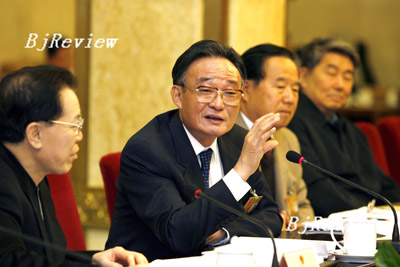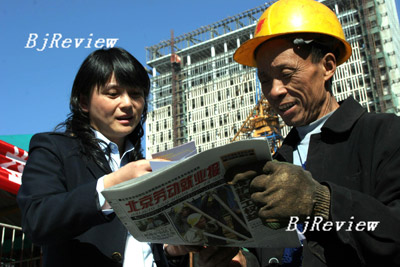
Gong Xiantian, a professor of jurisprudence at Peking University Law School, will likely be noted in Chinese legislative history for causing a proposed law to go through an unprecedented seventh reading because of his online post.
During a regular meeting of the Standing Committee of the National People's Congress (NPC) on December 24-29, China's draft property rights law was submitted for deliberation for the seventh time. It is hoped that the law will be voted upon at the full NPC session in March.
The drafters of the law, who had spent eight years on the issue, were shocked and angered when the vote on the law was withdrawn from the agenda of the NPC full session last March pending further revision and deliberation.
"I am happy that my suggestions finally worked," Gong said in February after learning that the law had been shelved.
The marathon legislative process for this particular law indicates that China's legislature is seriously considering public opinion and making new moves to democratize the legislative processes.
An influential comment
On July 9, 2005, the Standing Committee of the NPC published the full text of the third draft of the Law on Property Rights, which had gone through three deliberations since December 2003, on its website to solicit public comment. In the first month, a total of 10,032 suggestions were collected from the public, which showed enormous interest in the law.
Yet the most influential suggestion didn't come until eight days before the deadline. On August 12, 2005, Gong posted online a letter with the sensational title "A Law That Goes Against the Principles of Socialism and the Constitution."
In his petition to China's top legislator Wu Bangguo, Gong, a Marxist legal theorist, said the essence of the draft law is to protect the real property rights of the extremely rich minority, though in form it sounds as if everyone's rights would be protected. "It equally protects a rich guy's limousine and a beggar's rod," he said sarcastically in the letter.
He also indicated that the embezzlement of state-owned assets during the reform of state-owned enterprises could worsen should the draft be made into law without major revisions. According to a Xinhua report, China loses 40 billion yuan of state-owned assets annually through internal mismanagement and fraud.
Gong's primary concern is that the proposed law fails to include a clause in the Constitution stating that state property is sacred and inviolable, "which is the foundation of socialist legislative work," he said.
Although Gong based his criticism on an ideological argument instead of a legal point of view, the letter created a huge controversy in society, where large-scale ideological debates over socialism and capitalism have been largely unheard of since reform architect Deng Xiaoping called for a renewed push toward a market-oriented economy during his visit to southern China in early 1992.
While Gong was attacked by legal experts, especially the drafters of the laws, for delaying an essential part of a prospective civil code, Gong was widely supported by tens of thousands of Internet users, who worried about the widening income gap in society and about fraud and corruption in some people's headlong pursuit of private wealth.
This group posted items on online forums to support Gong and even praised him as a national hero. Gong's concerns have also been echoed by a handful of sociologists who suspect the country's first law to protect private ownership could undermine the legal foundation of China's socialist system.
The vocal war between the two camps of scholars and citizens, which sometimes evolved into a debate over who was trying to make the drafting process a political issue, immediately attracted the attention of China's legislature.
In September 2005, Gong was summoned to a one-and-a-half-hour meeting with leaders of the Commission of Legislative Affairs of the NPC Standing Committee. In an interview in February, Gong told the newspaper Southern Weekend that officials had briefed him on the whole process of drafting the property rights law. Gong said that at the end of the meeting "an official from the Commission of Legislative Affairs said to me that I was so far the only scholar to be asked for suggestions on a law."
Two weeks later, at a meeting with the law's drafting team, Wu put forward three requirements: their work must adhere to the correct political direction, the orientation should be the practical situation of China and copying provisions from the West is forbidden, and the basis of China's socialist economy is public ownership, which is essentially different from Western capitalist private ownership.
The final four deliberations over the course of one year saw the fulfillment of these requirements. When the law went into the seventh deliberation in December, it added a provision on the protection of state-owned assets that said, "Those who cause the loss of state-owned assets due to mismanagement and abuse of power should bear legal liability." The most recent draft has also stressed public ownership as the heart of the country's basic economic system.
The other hotly debated provisions-such as whether affluent urbanites can purchase prime country real estate to build holiday homes and retreats and how builders can renew the grant of land use when the 70-year term expires-have been subjected to repeated revisions during the seven readings. In the process, citizens got to know every revision of the draft from the media and their suggestions to a large extent decided the outcome of the next reading.
Revising a law

On October 27, 2005, the NPC Standing Committee adopted the revised law on personal income tax-effective as of January 1, 2006-which raised the cutoff point of residents' monthly income from the previous 800 yuan in most provinces and cities to 1,600 yuan. The cutoff point represented the majority opinion at a public hearing in September, the first time the NPC Standing Committee solicited public opinions on a revision of a law, through hosting a hearing of 20 people. The hearing in Beijing was open to nationwide application by any citizen above 18 years of age who earns a salary, and to facilitate the registration process online applications were accepted. The quotas for representatives were proportionally allocated to citizens from different regions, with different income levels and those who had different opinions about the income tax reduction so as to comprehensively reflect citizens' opinions.
Although a threshold for income tax may reflect nothing more than the result of a compromise among different interest groups in a heterogeneous country such as China, 1,600 yuan turned out to be quite satisfactory in reflecting the opinion of the majority in society.
According to a survey by the Social Survey Institute of China of 1,000 people in 10 cities three days after the new law was released, 77 percent of respondents supported the new threshold and 57 percent agreed that future legislation should adopt the procedure of holding public hearings.
"The legislative hearing is a major exploration of China's scientific and democratic legislation venture as well as a symbol that China's democratic legislation has entered a new development stage," said an editorial in Study Times, the official newspaper of the Central Party School of China's Communist Party. It said the legislative hearing system also provides the populace with effective training in how to practice democracy.
Given the opportunity, the Chinese public's enthusiasm for participating in creating a new law that concerns their daily lives could be brought into full play. Within one month after the first draft of the Labor Contract Law was released to the public in March, more than 190,000 suggestions were collected. The number of public suggestions exceeded those for every previous law except China's first Constitution adopted in 1954.
"Wide solicitation of public opinion in a transparent drafting process will guarantee better conformity after the law is adopted," said Wan Baogang, an assistant lawyer at the Beijing Dadi Law Firm. Wan also emphasized the efficiency of China's legislature and said lawmakers should accelerate the legislative process, which has been on a normal track only since China adopted its reform and opening-up policies in the late 1970s.
"China's legislation of commercial laws has been in full swing since the confirmation of the market economy in the early 1990s, but right now the current legal system still falls behind China's economic practices," said Xu Maokui, a professor at Renmin University of China and an expert in comparative studies of corporate governance laws.
As a lawyer, Wan often represents Japanese companies investing in China that are involved in business conflicts. He said China lags far behind Japan in the completeness of its civil and commercial law. He said his Japanese clients often take it for granted that their situation can be easily solved by referring to the law, only to find that there is no relevant commercial law or that such a law fails to carry specific regulations for a particular situation in China.
Under such circumstances, the government's ratification has to be solicited as a final verdict, which harms the independence of legislative power from administrative power. "While governments at all levels are dedicated to improving the investment environment to attract more capital inflows, I believe an important prerequisite is a perfect and complete legal system," said Wan.
He disagrees with Gong Xiantian's opinion that the deliberation of the property rights law should be extended. Wan studied for his master's degree at the law school of Shandong University, whose dean, Professor Liang Huixing, also headed the property rights law drafting team. Wan said it is rather incomprehensible that every law student in China like himself has been studying a central course on property rights law without such a law being in place in the country. In Wan's daily work, the lack of a property rights law has occasionally meant that he did not have the means to solve practical problems.
"While Japan promulgated its civil code over a century ago, China is still studying and formulating its civil code, but I hope the day is not far off when China catches up with Japan," Wan said.
| 